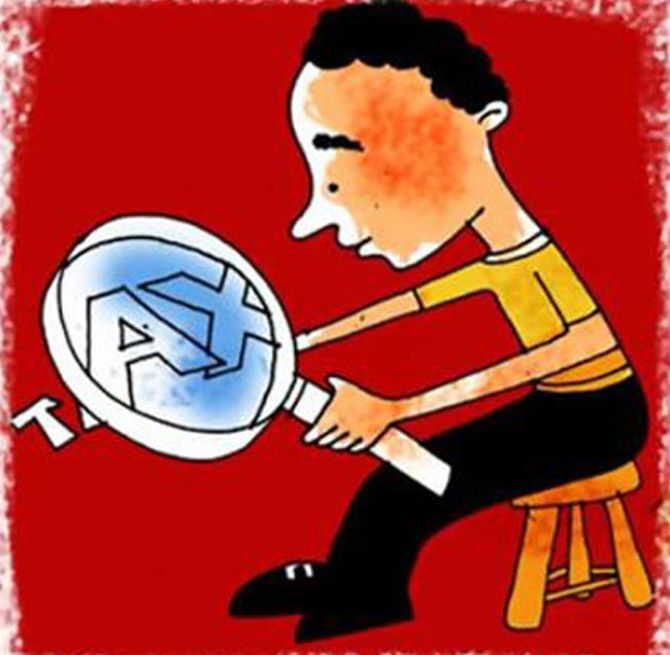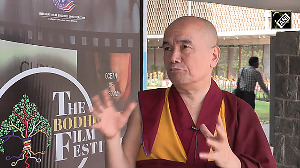By November 3, only 17,000 applications with tax payable amounting to Rs 1,100 crore have been received by the government, under the Sabka Vishwas Legacy Dispute Resolution Scheme.
The scheme gives a deep discount of 70 per cent for cases pending appeal where tax demand is more than Rs 50 lakh, and 50 per cent waiver beyond that amount.
Illustration: Dominic Xavier/Rediff.com

Mr X, a 75-year-old businessman, resigned from any kind of business activity and has a service tax liability of nearly Rs 40 lakh from business operations carried out years ago.
Currently under litigation, he is actively thinking of submitting an application towards probably the most lucrative amnesty scheme ever introduced by the government.
Though he has enough confidence in winning the case, he might prefer letting go of the legal hassles that could continue for years.
Yet, few are treading the road Mr X has taken, after half the time to apply for that very scheme is over.
By November 3, only 17,000 applications with tax payable amounting to Rs 1,100 crore have been received by the government, under the Sabka Vishwas Legacy Dispute Resolution Scheme, shows the official data accessed by Business Standard.
As many as 150,000 cases are currently under litigation, arrears, or investigation, with a pending tax demand of Rs 3.75 trillion.
The scheme gives a deep discount of 70 per cent for cases pending appeal where tax demand is more than Rs 50 lakh, and 50 per cent waiver beyond that amount.
Even in the case of arrears, the discount is a lucrative 60 per cent for tax demands below Rs 50 lakh, and 40 per cent above it.
In addition, the scheme waives any interest, fine, and penalty pending, and absolves taxpayers of any prosecution.
If all the prospective applicants come on board, the government can earn about Rs 1.5 trillion from the grand bargain, letting go of the fines and discounts.
Considering this, less than 1 per cent of the expectation has been achieved after half the time dried up.
Officials maintain there has not been a scheme as lucrative for taxpayers under dispute in the history of India’s tax administration.
The scheme is live from September 1, 2019 to December 31, 2019.
As is the case with every such scheme, prospective applicants will flock in at the last minute.
They were confident that December would witness a surge in applications.
But persons in the know, and who have the experience of how such amnesty schemes work, said the government might not get more than Rs 30,000-35,000 crore at the end of it.
Though lower than the ambitious estimate of Rs 1.5 trillion, the smart scheduling of the scheme could help the government reduce its fiscal deficit this fiscal, an area where it is probably run out of options.
The Central Board of Indirect Taxes and Customs (CBIC) can take a maximum of two months to process an application and finalise tax liability, after which, the taxpayer gets a maximum of one month to pay the amount.
All applications would thus, fructify into revenue within three months from December 31, 2019, which is by the end of 2019-20.
Experts think that though the scheme offers unprecedented discounts, there are some inherent issues associated with litigations, which might not attract big corporates with large legacy tax demands.
Pratik Jain, indirect tax leader at PwC, said the scheme is attractive for low-demand taxpayers, where the tax demand is below Rs 50 lakh.
“In most cases, companies confident of succeeding in the litigation will prefer not going on board. The industry wins around 80 per cent of such legacy dispute cases,” he told Business Standard.
“Taxpayers took time to understand and decode the intricacies, as the scheme is fairly detailed.
"We believe that due to tax audit, statutory deadlines, and Diwali holidays, they were preoccupied,” said Pritam Mahure, leader at a professional accountancy firm.
People in the know said that public sector enterprises, where the government is either the full or the majority owner, have been nudged to fall in line.
Tax demands from some public sector units are quite substantial, they said.
Officials said that the CBIC is applying the target-group approach to tackle cases in an efficient manner, and bring them on board.












 © 2025
© 2025